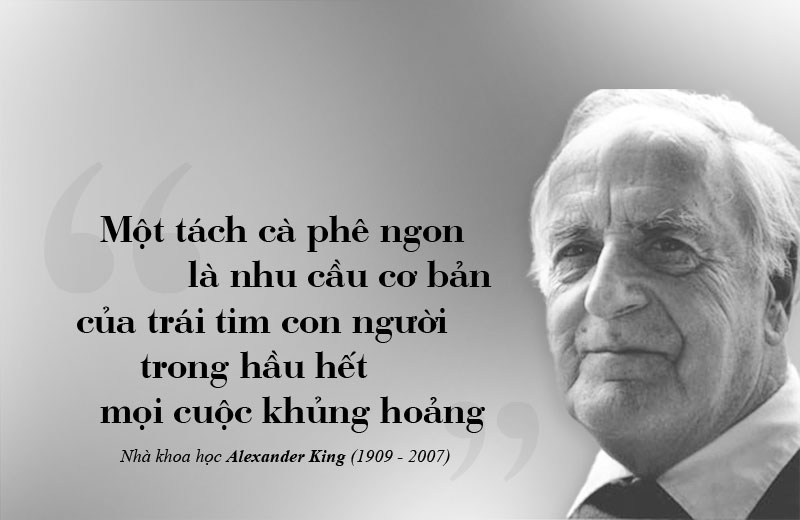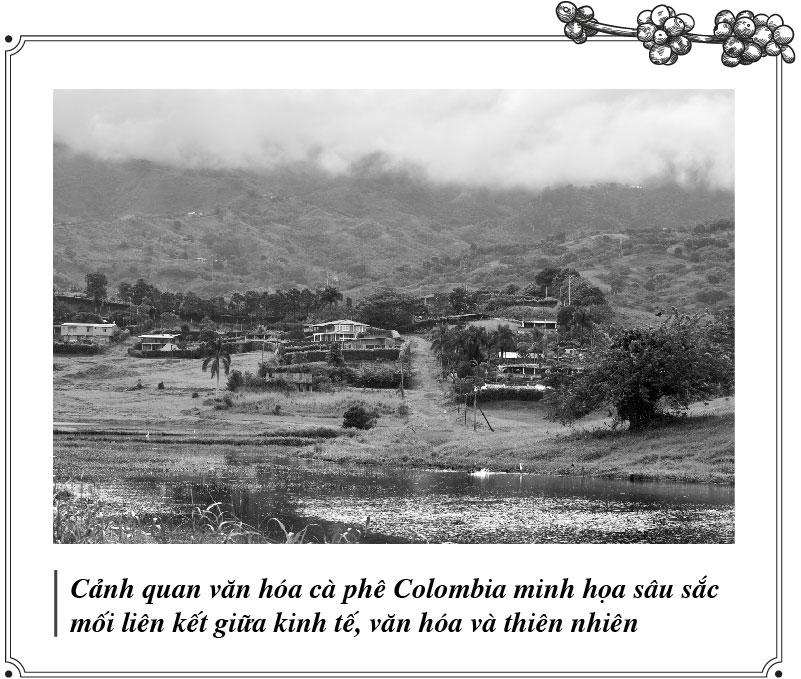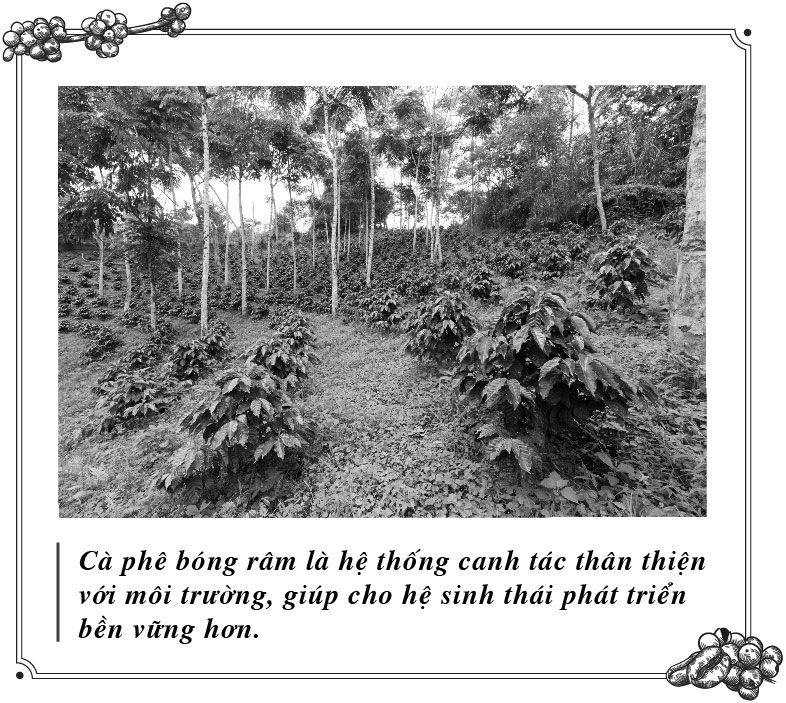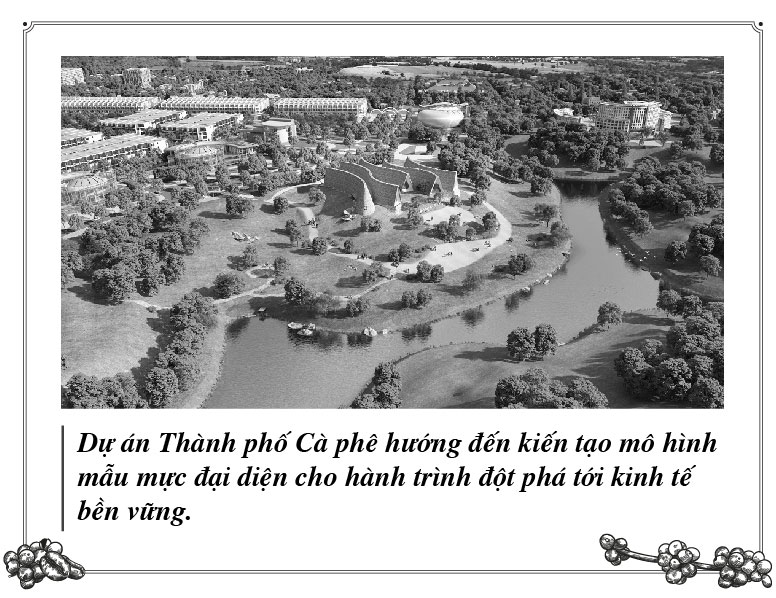Article 81: Coffee and the path to prosperity from a green economy
Coffee is an important factor promoting the process of creating a new economic civilization, operating in the direction of harmony with the environment, ensuring a shared sustainable prosperous future for both the ecology and humanity.

A good hot cup of coffee seems to be the basic need of the human heart in nearly every crisis. Scientist Alexander King (1909 – 2007)
Awaken the desire to create a blessed future
The world economy is operating based on material and honoring the consumption economy. Material things are almost equated with prosperity and a happy life. For a long time, commodity economic growth has become a central goal, occupying a top priority position in the development strategies of countries around the world. To satisfy material needs, people have found all ways to expand production, increase mineral exploitation, erode fossil energy and violently interfere in the natural environment. The dream of hegemony turned into a curse full of calamity. A series of interwoven crises in climate change, economic-financial, energy, food, poverty, epidemic, humanitarian, and social-ethical crises… have severely affected the global value development system, even for the most successful countries.

The Colombian coffee culture landscape profoundly illustrates the links between economy, culture and nature.
Pursuing material happiness by way of a life of insatiable consumption ultimately leads to imperfections and suffering from too much continuum instability. Recognizing that mess, more and more consumers around the world are questioning their lifestyle and real needs to ensure the survival of the world. It is no coincidence that the 1998 Nobel Prize in economics was awarded to Amartya Sen for his research on economic welfare, equality in economic and social relations. At the end of the 19th century, ethical consumerism emerged with the connotation that consumers decide to buy products mainly for ethical and ecological reasons. Thus, even being an ordinary person can have a greater influence on social change. This is a decisive awakening to the development of civilization on earth as well as of each people, each nation.

Shade coffee is an environmentally friendly farming system that helps the ecosystem develop more sustainably.
In that context, it is clear that the development of a green economy is an indispensable way to solve existing problems of instability. The green economy clearly connects 3 elements: economy – society – environment, to achieve a humane and prosperous life based on the balance between nature and people, between individuals and society as well as between generations. According to this trend, the coffee industry is fully capable of meeting the conditions of sustainable green economic development.
The coffee industry – commitment for action
All relevant partners and stakeholders operating in the coffee sector, from production, distribution, logistics, finance, trade, service provision, etc. to consumption, are aiming for a new business philosophy, in harmony with human life. The term “sustainable coffee” has been used since 1998, during a meeting of experts from the Smithsonian Migratory Bird Center (SMBC), NAFTA’s Commission for Environmental Cooperation (CEC) and the Consumer’s Choice Council (CCC).
By 2006, the Common Code for the Coffee Community (4C) was formed based on three key dimensions: The social dimension to ensure work safety and life well-being at an acceptable level for those who involve directly in production; The environmental dimension with the aim of protecting primary forests and preserving natural energy sources in the process of coffee cultivation and processing; The economic dimension aims to strengthen affordable sources of income for all stakeholders in the coffee chain, while at the same time expanding the process of international market participation and mastery of living conditions in a sustainable manner.
Certification standards have also been widely used to address sustainability concerns in coffee production and supply chains. Among them are: Fair Trade Certification, Rainforest Alliance Certification, UTZ Certification, 4C certification… Each certification may require different standards, but in general they are all geared towards multi-faceted biodiversity conservation and to ensure sustainable coffee industry development by transforming farming practices, business culture and consumer behaviour.

Green economic development towards ensuring human happiness, social justice and environmental and ecological issues.
The Sustainable Coffee Challenge, launched in 2015, strives to make coffee the world’s first sustainable agricultural product. To date, the movement has united more than 150 partners in the coffee industry chain from growers, traders, roasters, retailers to trigger a major change in the global coffee community. In 2016, the Global Coffee Platform was officially established, taking on the mission of finding ways to address sustainability challenges to improve economic, social, and environmental conditions for all who make their living by the coffee industry.
Countries in the coffee belt have been transitioning to shade coffee farming, a form of coffee growing that is covered by the shade of different plant species. This model reduces carbon dioxide emissions, supports biodiversity conservation, and minimizes soil erosion. Scientists have also studied recycling coffee grounds into biofuel, which offers significant environmental benefits compared to petroleum-refined diesel. In addition, manufacturers have chosen to use environmentally friendly and biodegradable packaging according to international standards. Coffee in this process acts as a green energy source with the ability to regenerate, preserve the environment and maintain biodiversity.
The new age must be based on a complete perception of the world. Green economy is a progressive philosophy that corrects the flaws of the market economy that have negatively impacted the ecological state. These are inherent concerns for the future of the planet as well as the social being. One of the ideals of the green economy is the establishment of Green Communities. Green communities create changes in thinking and practice of “eating – wearing – living” to promote the value of life in coexistence with nature.
Since 2010, within the framework of the World Economic Forum (WEF), Founder and Chairman of Trung Nguyen Legend Group Dang Le Nguyen Vu has delivered a speech “Vietnam’s message of sustainability in the context of Asia leading the global economic renaissance” emphasizes the need for a communitarian spirit and a global ethic to protect the earth’s ecology and the permanence of mankind. On the basis of global and human thinking, Trung Nguyen Legend Group is committed to paving the way with the strategic project of building a Coffee City to turn the Central Highlands – the mainland of Vietnamese coffee into a geographic model for harmonious and sustainable development, in which the ecological principles of “according to nature” will be fully applied.
Through the spirit of coffee to demonstrate its ability to lead a green economic model in a strategic vision, Vietnam sends a sustainable message to the world community, coming from a developing country, aspires to towards a prosperous future and make great contributions to the challenges and contribute more to the common efforts and responsibilities of the world community.

The Coffee City project aims to create an exemplary model representing a breakthrough journey towards a sustainable economy.
Today, coffee is already a global industry. Building a “coffee ecosystem”, moving towards creating a model of civilization, changing the concept of life and lifestyle is contributing to resolving the fundamental contradiction between the two aspects of humanity and the environment, cultivating harmonious relationship in the pursuit of human happiness and ecological sustainability.
THE REAL COFFEE
ROASTED ONLY FOR PEOPLE OF WISDOM!
Source: “The Philosophical Way of Coffee” – copyright by Trung Nguyen Legend


